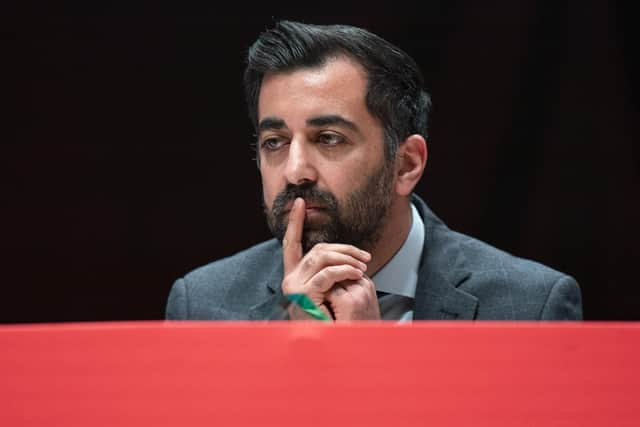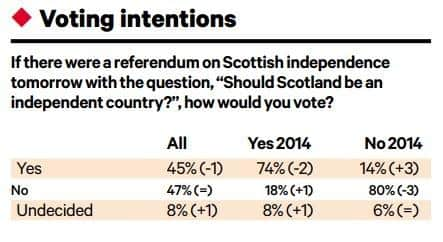Exclusive:New poll puts SNP and Labour neck and neck as pressure piles on Humza Yousaf


Labour are set to replace the SNP as the largest Scottish party in Westminster, a poll has suggested, with such a result likely fatally undermine the nationalist’s planned independence strategy.
It also paves the way for Anas Sarwar to enter Holyrood as First Minister after the next Scottish Parliamentary election on the back of Scottish Tory and Liberal Democrat votes.
Advertisement
Hide AdAdvertisement
Hide AdDespite the collapse in the SNP’s vote, support for independence remains split effectively 50/50 and the SNP is still likely to be the biggest party at the next Scottish Parliamentary elections.


The survey, undertaken by Savanta for The Scotsman, interviewed 1,002 Scottish adults online between October 6 and 11 and will heap the pressure on Humza Yousaf as his party heads to Aberdeen for its annual conference
Members are set to debate how it plans to fight the next general election, while the SNP leader seeks to regroup following a bruising week which saw a MP defect to the Conservatives, a thumping by-election defeat to Scottish Labour in Rutherglen, and a councillor being forced to resign over racist comments.
The scale of the reverse in the party’s fortunes is underlined by the disappearance of what was a 16 point lead over Scottish Labour at the SNP conference last year
Most analysts state the SNP leadership election, the ongoing police investigation into the party’s finances, and the collapse of Conservatives following the mini-budget resulting in a UK-wide swing behind Labour are the main reasons for the SNP’s decline.


Should an election be held tomorrow, the SNP (down three points) and Labour (up one point) would receive 35 per cent of the vote in Scotland, with the Conservatives behind in third on 19 per cent (up two points). The Scottish Liberal Democrats would be fourth on six per cent (down one), with other parties winning four per cent.
Changes are from Savanta’s last poll for The Scotsman in June.
In the unlikely event of a uniform swing, Labour would comfortably replace the SNP as the biggest party in Scotland for the first time since the 2010 election.
Advertisement
Hide AdAdvertisement
Hide AdAccording to Electoral Calculus, such a result would see the SNP win just 19 seats to Labour’s 28, with the Conservatives holding on to their six seats, while the Liberal Democrats would win four seats, up two.
However, given the number of extremely tight marginal seats between the SNP and Labour in the central belt and potential tactical voting across Scotland by unionist voters similar to that witnessed in Rutherglen, it would likely only take a handful of votes for Labour or the SNP to win several additional seats.
This puts the result of the general election in Scotland on a knife-edge.
Looking ahead at the 2026 Holyrood election, the SNP retains their lead in the constituency vote with 37 per cent (down three), with Labour close behind on 33 per cent (no change).
The Scottish Tories secure 18 per cent of the vote (up two points), with the Liberal Democrats on six per cent (down two), with other parties gaining five per cent of the vote (up two).
On the regional list, Scottish Labour are ahead of the SNP with 29 per cent (up one), with the SNP on 28 per cent (no change) and the Conservatives on 20 per cent (up two).
The Scottish Greens are on 13 per cent (no change) while the Liberal Democrats are on eight per cent (down three), with other parties on two per cent (down one).
Such a result would see the SNP lose 23 seats to sit on 41, with Labour close behind on 39 seats, 24 more than in 2021. The Scottish Conservatives would lose seven seats and drop to 24 overall, with the Scottish Greens more than doubling their representation to 17 seats.
Advertisement
Hide AdAdvertisement
Hide AdScottish Liberal Democrats would also gain seats, doubling their representation to eight.
Such a result would see any potential SNP/Green coalition seven seats short of an overall majority in Holyrood.
This would pave the way for Anas Sarwar to become First Minister with the support of the Scottish Conservatives and Scottish Liberal Democrats.
The Scottish Labour leader plans to run a minority administration after the 2026 Holyrood election, and it is an open secret this will be supported by other unionist parties to remove the SNP from office.
His personal ratings are also better than Humza Yousaf, with Mr Sarwar the only politician with a positive net favourability of +3, up four points, while the SNP leader sits on -16 per cent, down six points.
Despite the SNP’s struggles, independence support remains very stable with no changes since the last time the question was asked.
Yes support sits at 45 per cent (down one point) with No support at 47 per cent (no change) and undecideds on eight per cent (up one point).
With undecideds removed, this puts Yes at 49 per cent and No at 51 per cent.
Advertisement
Hide AdAdvertisement
Hide AdChris Hopkins, political research director at Savanta says the combined possibility of tactical voting and a Labour ascendancy makes things hard for Humza Yousaf.
He said: “The SNP's continued decline is further evidenced in this latest poll from Savanta for The Scotsman, showing for the first time Labour tied with the SNP.
"While changes poll-on-poll are rarely outside the margin of error, the trend since June 2022 has seen a 21-point SNP lead completely eroded, and they would have little chance of claiming to be the largest party in Scotland if these figures played out at the next election."
“Labour are in the ascendency after a great recent by-election result, and that's reflected too in Anas Sarwar's personal ratings. His fortunes at the moment are significantly better than Humza Yousaf's, and while following Nicola Sturgeon was always going to be difficult, the SNP's declining poll ratings started well before Yousaf took office.
"Evidence in Rutherglen and Hamilton West of unionist tactical voting compounds the SNP's electoral issues, and Yousaf may well soon be tempted to employ some damage limitation tactics akin to the ones being used by Rishi Sunak in England in order to stop the SNP's declining ratings before even attempting to turn things around.”
Comments
Want to join the conversation? Please or to comment on this article.
